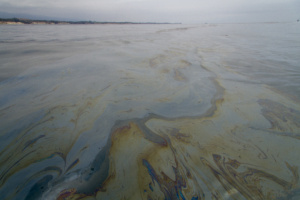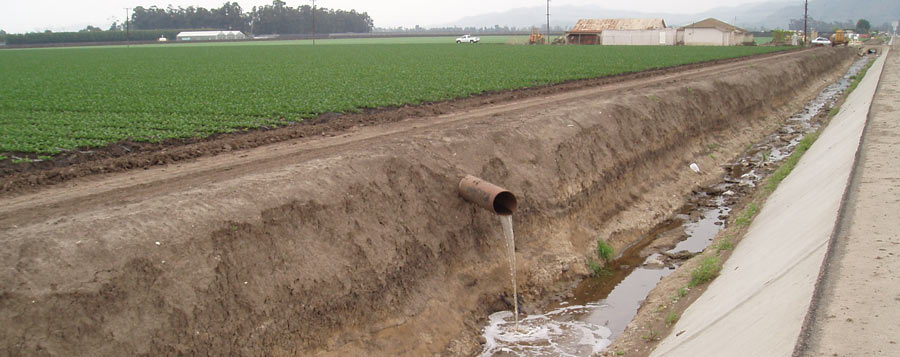Santa Barbara Channelkeeper works to protect and restore the Santa Barbara Channel and the creeks, wetlands, rivers, and beaches that flow into it, but our impact is greater when you lend your voice to the cause. Your participation makes a difference!
Here’s how you can help.
 Voice Your Opposition to the Reactivation of Offshore Oil Operations Along the Gaviota Coast
Voice Your Opposition to the Reactivation of Offshore Oil Operations Along the Gaviota Coast
Nine years ago, a corroded pipeline on the Gaviota Coast ruptured, spewing more than 120,000 gallons of crude oil near Refugio State Beach. It caused one of the largest oil spills in California’s history, resulting in $750 million in damage to our coastal environment, local fisheries, and ocean-dependent businesses, in addition to the deaths of more than 775 marine mammals and birds.
A Texas-based oil company, Sable Offshore, is currently attempting to restart offshore oil production using the same pipeline, along with three offshore platforms called the Santa Ynez Unit and two onshore processing facilities on the Gaviota Coast. They have promised their shareholders that production will begin by the end of the year.
It should be noted that President Biden’s recent executive action to ban offshore oil development by prohibiting new drilling leases does not affect Sable Offshore’s existing leases and operations.
Channelkeeper stands with the Environmental Defense Center and other organizations in opposing the restart of oil production from the Santa Ynez Unit and conveyance through the corroded pipeline that damaged our coast in 2015. Together we uphold that the approval of the state waiver should be suspended until State agencies carry out a full oversight and environmental review of the restart project.
We invite community members to take action by expressing their disapproval of the waiver’s issuance and the project’s advancement to Governor Gavin Newsom and California Secretary for Natural Resources Wade Crowfoot.
The public can also provide comments at the Santa Barbara County Board of Supervisors meeting tentatively scheduled for February 25. During this meeting, the County Board of Supervisors will consider an appeal of the transfer of pipeline permits from Exxon Mobil to Sable Offshore approved by the Santa Barbara County Planning Commission in October of 2024.
Get involved:
- Call Governor Gavin Newsom’s office (916-445-2841) to express your disapproval. The California Department of Forestry and Fire Protection (CAL FIRE) is the agency under the Newsom administration that granted the corrosion protection waiver.
- Call Secretary Wade Crowfoot (916-653-5656) to share your concerns. Secretary Crowfoot leads the California Natural Resources Agency, which directly supervises CAL FIRE.
- Attend the tentative February 25 Santa Barbara Board of Supervisors meeting in person. It will take place in the Santa Barbara County Administration Building Board Hearing Room, Fourth Floor, 105 East Anapamu Street, Santa Barbara.
- Submit written public comment via email prior to 5:00 PM on the day prior to the February 25 Santa Barbara Board of Supervisors meeting. Email comments to: [email protected]. Your comments will be distributed to the Board and posted online.
- Participate in the February 25 meeting by Zoom. Check for meeting details on the County of Santa Barbara’s meeting calendar and find links to register in advance if you would like to provide verbal public comments.
Talking Points:
– CAL FIRE has granted a state waiver to Sable that will accelerate development on a dangerous oil pipeline. This poses grave threats to California and Santa Barbara communities and natural resources and should not have happened on your watch.
– I’m extremely disappointed that a pivotal decision was made by CAL FIRE without any meaningful public engagement process.
– Explain why you feel that it is important to protect the Gaviota Coast from another oil spill.
– We need a proper environmental review and public engagement process. Please do not allow this unacceptable fast-tracking of reactivated oil and gas operations to continue.
Protect Our Waters – Set Common Sense Limits on Fertilizer Application for Farms

California leads the nation as a top agricultural producer – but the cost to our drinking water and environment is huge.
Over-application of fertilizer on farms is the biggest source of pollution to our groundwater supplies. Records show that the vast majority of farms egregiously over-apply fertilizer. According to the Central Coast Regional Water Quality Control Board ("Regional Board"), over half the nitrogen applied as fertilizer ends up as harmful pollution to the environment. Currently, farms discharge nitrogen at levels ten times higher than levels that are safe for drinking water and protective of the environment. The Regional Board has issued findings that “groundwater nitrate (fertilizer) contamination is widespread and severe, and degradation is increasing in many areas.” Nitrates leaching from fields into aquifers have left over 100,000 square miles of groundwater contaminated with nitrates throughout California, resulting in toxic drinking water supplies.
Nitrogen pollution from fertilizers is also harmful to ecosystems. Nitrogen pollution in streams, wetlands, and the ocean can fuel toxic algal blooms, which can make swimming unsafe, poison marine life, and shut down entire fisheries.
To address this detrimental overuse of fertilizers on farms, the Regional Board is proposing to set new limits for fertilizer application. These new limits would require farmers to apply only as much fertilizer as their crops actually need.
To support clean water, and to help tackle the State's biggest water pollution problem, please sign our petition to support fertilizer application limits for farms.
Use the form below to send the following message directly to decision makers:
To: Central Coast Regional Water Quality Control Board
From: [Your Name]
Dear Central Coast Regional Water Quality Control Board,
I support responsible agriculture AND clean water. We can achieve both, but limits must be established to prevent farms from over-applying fertilizer. Please protect our rivers, wetlands, ocean, and ground water supplies. Require farms to stop over-fertilizing and allow application of only as much fertilizer as crops reasonably need. Thank you for helping to address the State’s biggest water pollution problem.
